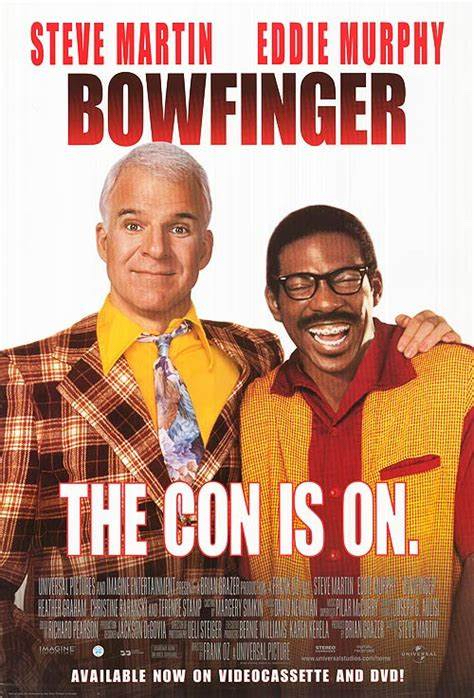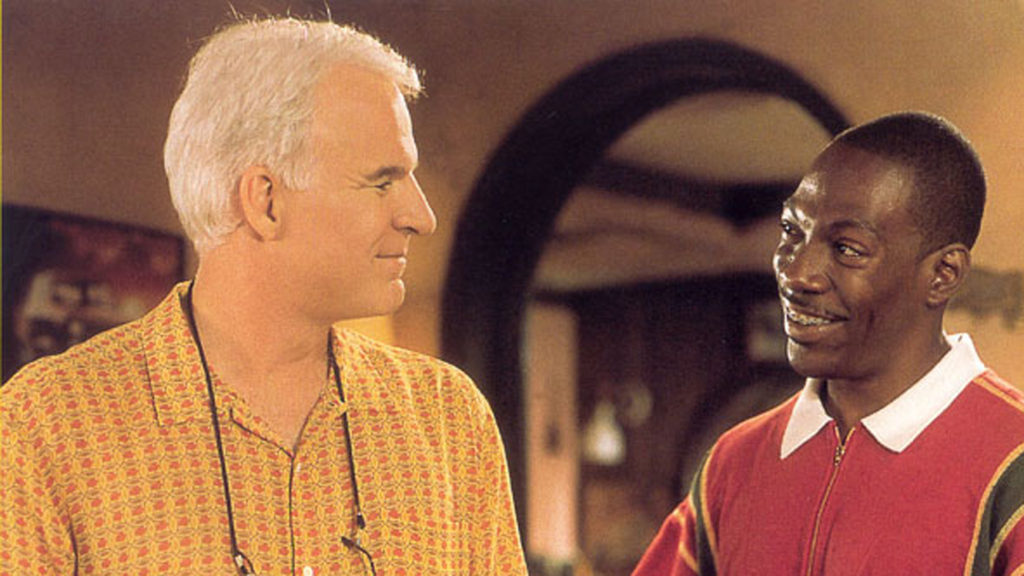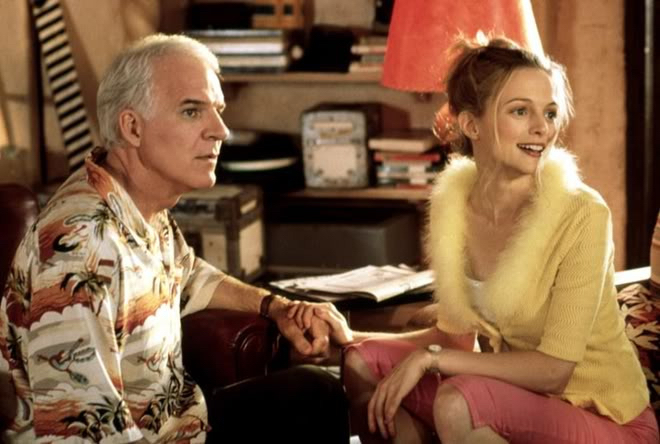Week of April 5 – 11, 2020
Director Frank Oz and star Steve Martin have made four films together, all of which I enjoy, and Bowfinger is the sweetest of them. I actually like Dirty Rotten Scoundrels the most (I think Ruprecht the Monkey Boy is hilarious), and I like HouseSitter, too. Martin has only a small part in Little Shop of Horrors but it is key to the film’s cruel humor. But Bowfinger is major Martin; he wrote the script and his manic intensity keeps the film moving along at a brisk pace. Most importantly, his enthusiasm for making his movie is infectious.

While the film’s poster intimates that a con job forms the plot, that is not very accurate, and that, along with the weird title, probably accounted for the fact that the movie did not do well in its theatrical run. I think many people said to themselves, “What the hell is a Bowfinger?” and then decided not to find out. Well, the answer is it’s a person, film director and producer Bobby Bowfinger. The original title was Bowfinger’s Big Thing, which is a bit better, but also full of innuendo. Like a lot of other movies, it’s a shame that the marketing department couldn’t imagine a better title or campaign. Because the film that the marketers didn’t know how to market is pretty darn good.
This is a movie about last chances, and taking advantage of opportunities before they pass by forever, strongly signified by the song that plays under the opening credits, Johnny Adams’ beautiful ballad “One More Time.” Bobby Bowfinger (Steve Martin) is still looking for his big break, and he’s about to hit 50. He knows that few people ever find Hollywood success after 50, so when he reads a spec script by his accountant Afrim (Adam Alexi-Malle), he thinks he has found the project that will save his career. It is an alien invasion script called “Chubby Rain.”
And that should indicate the comedic level of the material. It’s definitely low-brow, with plenty of Tinseltown targets from which to choose. A kooky filmmaker desperate for success. Agents on the make for any deal they can make. A starlet new in town, willing to do anything for a good movie role. A big action star, paranoid about fame, trusting in a self-help guru to keep him sane. His nerdy brother, just wanting to participate in show biz. The filmmaker’s ploy to film the star without his knowledge, and without letting his own crew in on the secret. The film crew, making do with whatever they can find to make their movie as fast and cheaply as possible. This is the milieu of Bowfinger, and it doesn’t even hint at the comic possibilities.
The big action star is Kit Ramsey (Eddie Murphy), who is so increasingly paranoid (and possibly schizophrenic) that he requires constant care from his handlers. Bowfinger makes a handshake deal with executive Jerry Renfro (Robert Downey, Jr.) to make his film with Kit Ramsey, but Kit wants nothing to do with it. So Bowfinger and his crew begin to follow Ramsey around, grabbing shots of him when they can, and filming encounters between him and the film’s female leads, Carol (Christine Baranski) and Daisy (Heather Graham). These encounters only fuel Ramsey’s paranoia, but also lead to a better performance!

Then Bowfinger finds Jiff (Eddie Murphy), who turns out to be Kit’s brother. Jiff works as an assistant on the production, cluelessly provides info about his brother’s whereabouts when asked, and doubles as the star in long shots and one hilariously frightful sequence crossing a busy freeway.
The guerrilla filmmaking techniques employed in making Bowfinger’s silly science fiction movie are wonderfully portrayed. From “borrowing” studio cameras and equipment each day to using a speeding crane to parallel a busy highway for an aerial shot, director Frank Oz has his faux filmmakers using every trick in the book, and exults in their audacity. My favorite moment occurs in a dark parking garage, when the crew needs a creepy shot of Ramsey walking away from his car. The trick they use to make him nervous is hilarious, and is hilariously shown.
Much of the comedy revolves around Kit Ramsey’s reactions to people whom he doesn’t know talking to him about stuff he doesn’t understand, which only increases his nervousness. Believe it or not, this scheme of filming around someone who doesn’t know he is being filmed has been actually used before; Mary Pickford was the object of such attention when she vacationed in Russia in 1927. She and husband Douglas Fairbanks actually cooperated with the filmmakers when they learned of the project — which is actually what occurs in this movie, after further complications.

who is always angling for a bigger role.
I’m afraid I haven’t done justice to the comic fecundity of this script. Everyone involved makes the most of their roles, especially Eddie Murphy, who shines as both the big Hollywood action star, and his introverted, shy brother Jiff. Kit is, as should be expected, an arrogant jerk, so the cruelty to which he is exposed doesn’t seem as mean as it probably is. But Jiff is as sweet as can be, so his manipulation by the desperate director adds more drama to the story. Frank Oz establishes and then satirizes the familiar Hollywood tropes: the vain actress (Carol); the avaricious starlet (Daisy); the seriousness about nudity; the need for a good catch phrase; etc.
The reason that all this works, even as characters are being lied to and manipulated, is that everyone involved in the film’s evolution — sharing in Bowfinger’s dream — believes in what they are doing. The camaraderie that arises from doing something like this together, even when it is as obviously silly as “Chubby Rain,” is undeniably real, and we as viewers get to share in it. We’ve all seen video of championship teams celebrating their “all for one” approach to winning, and heard performers being interviewed who proclaim their everlasting love for the cast and crew of their latest project. This movie takes that idea and stretches it out over a breezy 97 minutes, showing us how making a goofy little movie on the sly fulfills these people and changes their lives for the better.
It even viscerally rewards the characters by giving them a big Hollywood premiere. Like Ed Wood, this movie gives its cast of characters a chance to see their work on the big screen with an appreciative audience. It is a feel-good moment of vindication for them, one that has a wider implication for all of Hollywood’s product, schlocky or genuinely thrilling. For anyone who loves movies, sequences like this one should only reinforce that emotion. It is almost enough to make me want to watch “Chubby Rain.” Almost. Aww, who am I kidding? Of course I would watch “Chubby Rain.” Bring it on! ☆ ☆ ☆. Backdated to April 5, 2020.
Similar movies include The Best of Times (1986), Defending Your Life (1991), other films with a “second chance” or “last chance” theme.
